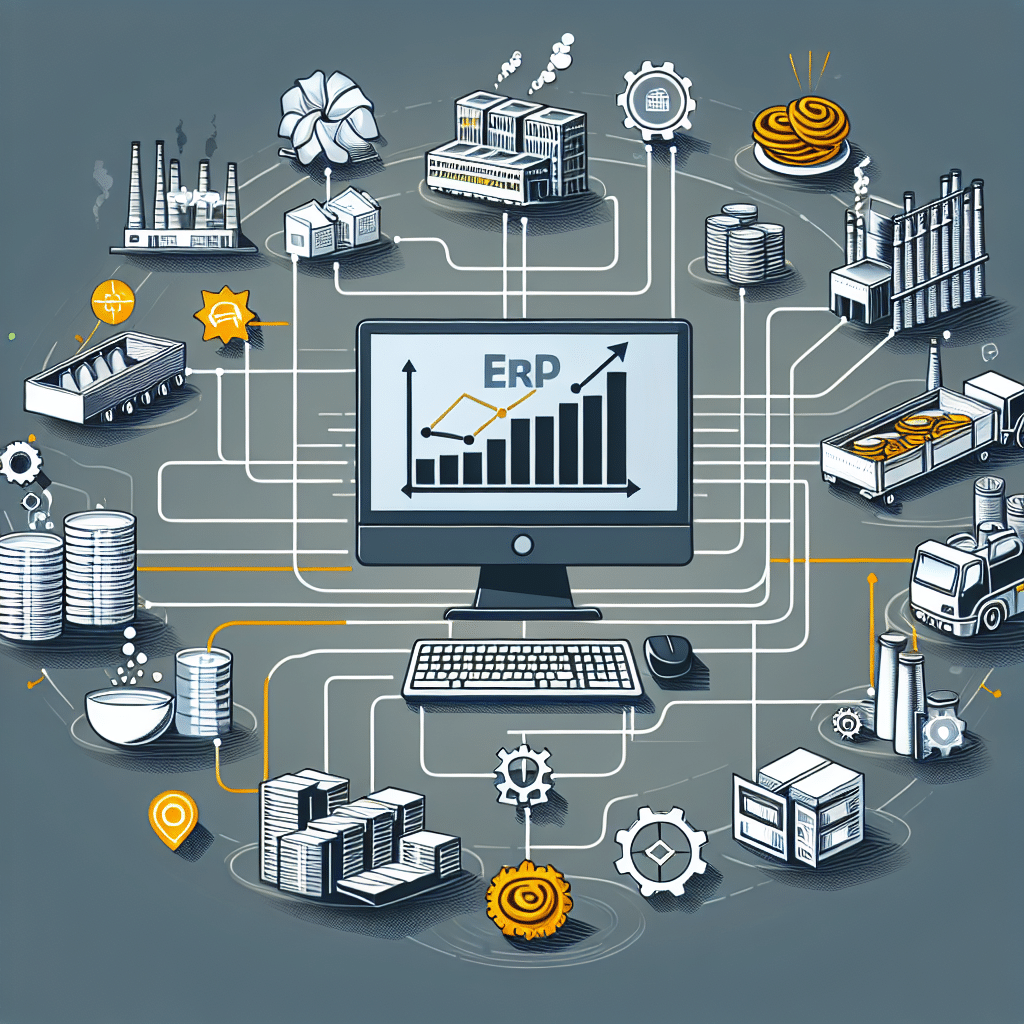Role of ERP in the Digital Transformation of Food Companies
-
Table of Contents
- ERP’s Pivotal Role in Food Companies’ Digital Transformation
- Understanding ERP and Its Impact on the Food Industry
- Streamlining Operations and Supply Chain Management
- Enhancing Food Safety and Compliance
- Improving Customer Relationships and Demand Planning
- Driving Innovation and Product Development
- Case Studies and Statistics
- Challenges and Considerations in ERP Implementation
- Conclusion: Key Takeaways for Food Companies
- ETprotein: Enhancing Food Companies’ Protein Offerings
ERP’s Pivotal Role in Food Companies’ Digital Transformation

The food industry is undergoing a significant transformation, driven by the rapid advancement of digital technologies. At the heart of this change is the implementation of Enterprise Resource Planning (ERP) systems, which are becoming increasingly crucial for food companies looking to stay competitive in a dynamic market. This article explores the role of ERP in the digital transformation of food companies, highlighting how these systems are revolutionizing the industry.
Understanding ERP and Its Impact on the Food Industry
ERP systems are comprehensive software platforms that integrate all facets of a business, from supply chain management to customer relationship management, finance, human resources, and more. In the food industry, ERP solutions are tailored to address specific challenges such as perishability, food safety, regulatory compliance, and complex supply chains.
Streamlining Operations and Supply Chain Management
One of the primary benefits of ERP systems in the food industry is the streamlining of operations and supply chain management. By providing a centralized platform for data management, ERPs enable food companies to:
- Monitor inventory levels in real-time, reducing waste and ensuring fresh products.
- Optimize procurement processes and manage supplier relationships effectively.
- Automate production scheduling to meet demand without overproducing.
- Track products throughout the supply chain, enhancing traceability and recall management.
Enhancing Food Safety and Compliance
Food safety and regulatory compliance are critical concerns for food companies. ERP systems help by:
- Providing tools for quality control and batch tracking.
- Ensuring compliance with industry standards such as HACCP, FDA, and FSMA.
- Automating documentation and reporting processes to meet regulatory requirements.
Improving Customer Relationships and Demand Planning
ERP systems also play a vital role in managing customer relationships and demand planning. They allow food companies to:
- Analyze customer data to understand buying patterns and preferences.
- Forecast demand more accurately, leading to better inventory management.
- Enhance customer service through timely and accurate order fulfillment.
Driving Innovation and Product Development
Innovation is key to staying ahead in the food industry. ERP systems support this by:
- Facilitating research and development processes.
- Shortening the time-to-market for new products.
- Integrating customer feedback into product development.
Case Studies and Statistics
Several case studies and statistics underscore the transformative impact of ERP on food companies:
- A study by Aberdeen Group found that organizations with ERP systems saw a 22% reduction in operating costs.
- According to Panorama Consulting Solutions, 95% of businesses experience an improvement in their processes after ERP implementation.
- A report by ResearchAndMarkets.com predicts the global food ERP market size will reach $10.8 billion by 2026, growing at a CAGR of 7.2%.
Challenges and Considerations in ERP Implementation
While the benefits are clear, implementing an ERP system comes with its challenges. Food companies must consider:
- The cost and complexity of ERP software.
- The need for employee training and change management.
- Choosing the right ERP vendor that understands the nuances of the food industry.
Conclusion: Key Takeaways for Food Companies
In conclusion, ERP systems are indispensable in the digital transformation of food companies. They offer numerous benefits, including improved efficiency, food safety, compliance, customer satisfaction, and innovation. However, successful implementation requires careful planning, investment, and a willingness to adapt to new processes.
ETprotein: Enhancing Food Companies’ Protein Offerings
As food companies continue to innovate and expand their product lines, partnering with reliable suppliers like ETprotein can provide a competitive edge. ETprotein’s range of high-quality protein products, including organic rice protein, pea protein, and various seed proteins, can help food companies meet the growing demand for plant-based and health-conscious options. Their commitment to non-GMO, allergen-free ingredients with high purity levels makes them an ideal choice for food companies looking to enhance their offerings in the digital age.
About ETprotein:
ETprotein, a reputable protein and L-(+)-Ergothioneine (EGT) Chinese factory manufacturer and supplier, is renowned for producing, stocking, exporting, and delivering the highest quality organic bulk vegan proteins and L-(+)-Ergothioneine. They include Organic rice protein, clear rice protein, pea protein, clear pea protein, watermelon seed protein, pumpkin seed protein, sunflower seed protein, mung bean protein, peanut protein, and L-(+)-Ergothioneine EGT Pharmaceutical grade, L-(+)-Ergothioneine EGT food grade, L-(+)-Ergothioneine EGT cosmetic grade, L-(+)-Ergothioneine EGT reference grade and L-(+)-Ergothioneine EGT standard. Their offerings, characterized by a neutral taste, non-GMO, allergen-free attributes, with L-(+)-Ergothioneine purity over 98%, 99%, cater to a diverse range of industries. They serve nutraceutical, pharmaceutical, cosmeceutical, veterinary, as well as food and beverage finished product distributors, traders, and manufacturers across Europe, USA, Canada, Australia, Thailand, Japan, Korea, Brazil, and Chile, among others.
ETprotein specialization includes exporting and delivering tailor-made protein powder and finished nutritional supplements. Their extensive product range covers sectors like Food and Beverage, Sports Nutrition, Weight Management, Dietary Supplements, Health and Wellness Products, and Infant Formula, ensuring comprehensive solutions to meet all your protein needs.
As a trusted company by leading global food and beverage brands and Fortune 500 companies, ETprotein reinforces China’s reputation in the global arena. For more information or to sample their products, please contact them and email sales(at)ETprotein.com today.












